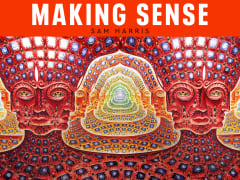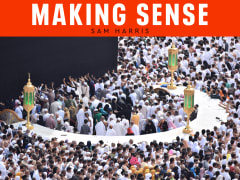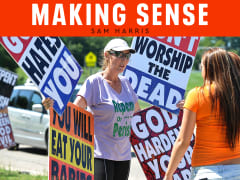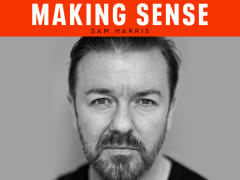

A Collection of Notable Episodes From the Making Sense Podcast
Not everyone agrees with everything Sam Harris says, but I am a big fan and he certainly makes you think. Here's a collection of episodes from his Podcast that you might like to start with. This is a combination of episodes that I enjoyed, as well as some that regularly get mentioned in discussion forums such as Reddit. You can see all the episodes at https://samharris.org/podcast/ Note: The podcast is now a paid service. It's worth the money if you can afford a few dollars a month, otherwise Sam is very generous in offering a free subscription to those who cannot afford to pay. You can also listen to the first part of all episodes to get a taste of things. Am I missing an important episode? Send me suggestions using the link at the end of the list.
#177 - Psychedelic Science

In this episode of the Making Sense podcast, Sam Harris speaks with Roland Griffiths about the current state of research on psychedelics. They discuss the historical prohibition against their use; the clinical and scientific promise of psilocybin, mescaline, LSD, DMT, MDMA, and other compounds; the risks associated with these drugs; the role of “set and setting”; the differences between psychedelics and drugs of abuse; MDMA and neurotoxicity; experiences of unity, sacredness, love, and truth; the long-term consequences of psychedelic experiences; synthetic vs natural drugs; the prospects of devising new psychedelics; microdosing; research on psilocybin and long-term meditators; the experience of encountering other apparent beings; psilocybin treatment of addiction; and other topics. In his Afterword, Sam discusses his experience on a large dose of psilocybin—his first psychedelic experience in 25 years.
Roland Griffiths, Ph.D., is a Professor in the Departments of Psychiatry and Neurosciences at the Johns Hopkins University School of Medicine, and founding Director of the Johns Hopkins Center on Psychedelic and Consciousness Research. He is author of over 380 journal articles and book chapters, and has trained more than 50 postdoctoral research fellows. Roland has been a consultant to the National Institutes of Health, to numerous pharmaceutical companies in the development of new psychotropic drugs, and as a member of the Expert Advisory Panel on Drug Dependence for the World Health Organization.
#175 - Leaving the Faith

In this episode of the Making Sense podcast, Sam Harris speaks with Yasmine Mohammed about her book Unveiled: How Western Liberals Empower Radical Islam. They discuss her family background and indoctrination into conservative Islam, the double standard that Western liberals use when thinking about women in the Muslim community, the state of feminism in general, honor violence, the validity of criticizing other cultures, and many other topics.
Yasmine Mohammed is a human rights activist and writer. She advocates for the rights of women living within Islamic majority countries, as well as those who struggle under religious fundamentalism. She is the founder of Free Hearts Free Minds, an organization that provides psychological support for ex-Muslims living within Muslim majority countries.
Website: YasmineMohammed.com
Twitter: @YasMohammedxx
#172 - Among the Deplorables

In this episode of the Making Sense podcast, Sam Harris speaks with Andrew Marantz about his book Antisocial: Online Extremists, Techno-Utopians, and the Hijacking of the American Conversation. They discuss the effect of social media on politics, the distinction between publishers and platforms, the problem of guilt by association, getting too close to interview subjects, the confusing nature of troll culture, the notion of “dog whistles,” how to respond to the current reality of racism, and other topics.
Andrew Marantz is a staff writer at The New Yorker, where he has worked since 2011. His work has also appeared in Harper’s, New York, Mother Jones, the New York Times, and many other publications. A contributor to Radiolab and The New Yorker Radio Hour, he has spoken at TED and has been interviewed on CNN, MSNBC, NPR, and many other outlets.
Website: andrewmarantz.com
Twitter: @andrewmarantz
#171 - Escaping a Christian Cult

In this episode of the Making Sense podcast, Sam Harris speaks with Megan Phelps-Roper about her book Unfollow: A Memoir of Loving and Leaving the Westboro Baptist Church.
Megan Phelps-Roper is a writer, educator, and former member of the Westboro Baptist Church. After leaving the church in 2012, Megan began writing and speaking about her experience within the church and decision to defect. As an educator, she covers topics related to extremism and communication across ideological lines.
Website: meganphelpsroper.com
Twitter: @meganphelps
#163 - Ricky Gervais

In this episode of the Making Sense podcast, Sam Harris speaks with Ricky Gervais. They discuss fame, the effect of social media, the changing state of comedy, offensive jokes, Louis CK, political hypocrisy, Brexit and Trump, the state of journalism, and other topics.
Ricky Gervais is a stand-up comedian, actor, director, and screenwriter. He co-created and starred in the BBC mock documentary series The Office and the sitcom series Extras. His recent projects include the show After Life and the stand-up comedy special Humanity, both released on Netflix. He is currently working on another comedy special for Netflix called Supernature.
Website: rickygervais.com
Twitter: @rickygervais
#142 - Addiction, Depression & a Meaningful Life

In this episode of the Making Sense podcast, Sam Harris speaks with Johann Hari about his books Chasing the Scream and Lost Connections.
Johann Hari is the New York Times bestselling author of Chasing the Scream, which is being adapted into a feature film. He was twice named “Newspaper Journalist of the Year” by Amnesty International UK. He has written for The New York Times, The Los Angeles Times, and others. His TED talk, “Everything You Think You Know About Addiction Is Wrong,” has more than 20 million views. His most recent book is Lost Connections: Uncovering the Real Causes of Depression – and the Unexpected Solutions.
Website: johannhari.com
Twitter: @johannhari101
#136 - Digital Humanism

In this episode of the Making Sense podcast, Sam Harris speaks with Jaron Lanier about the economics, politics, and psychology of our digital lives. They discuss the insidious idea that information should be free, what we should want from an advanced economy, the role of advertising, libertarianism in Silicon Valley, the problems with social media, and other topics.
Jaron Lanier is a scientist, musician, and writer best known for his work in virtual reality and his advocacy of humanism and sustainable economics in a digital context. His 1980s start-up VPL Research created the first commercial VR products and introduced avatars, multi-person virtual world experiences, and prototypes of major VR applications such as surgical simulation. His books Who Owns the Future? and You Are Not a Gadget were international bestsellers, and Dawn of the New Everything was named a 2017 best book of the year by The Wall Street Journal, The Economist, and Vox. His most recent book is 10 Arguments for Deleting Your Social Media Accounts Right Now.
#130 - Universal Basic Income

In this episode of the Making Sense podcast, Sam Harris speaks with presidential candidate Andrew Yang about “universal basic income” (UBI). They discuss the state of the economy, the rise of automation and AI, the arguments for and against UBI, and other topics.
Andrew Yang is the founder of Venture for America, a major non-profit that places top college graduates in start-ups for two years in emerging U.S. cities to generate job growth and train the next generation of entrepreneurs. Yang has been the CEO, co-founder or executive at a number of technology and education companies. Yang was named a Presidential Ambassador of Global Entrepreneurship and a Champion of Change by the White House and one of Fast Company’s “100 Most Creative People in Business.” He was also named to the National Advisory Council for Innovation and Entrepreneurship of the Department of Commerce. A major documentary with an Oscar-winning director, Generation Startup, featuring Yang and Venture for America, was released in Fall 2016 and is available on Netflix and other streaming platforms. He is a graduate of Columbia Law, where he was an Editor of the Law Review, James Kent Scholar and winner of the Class of 1912 Prize, and Brown University where he graduated with degrees in Economics and Political Science. He is the author of The War on Normal People: The Truth About America’s Disappearing Jobs and Why Universal Basic Income Is Our Future.
Website: https://www.yang2020.com/
Twitter: @AndrewYangVFA
#127 - Freedom from the Unknown

In this episode the Making Sense podcast, Sam Harris speaks with Michael Pollan about his new book How to Change Your Mind. They cover the the resurgence of interest in psychedelics in clinical practice and end-of-life care, the “betterment of well people,” the relationship between thinking and mental suffering, the differences between psychedelics and meditation, the non-duality of consciousness, the brain’s “default mode network,” their experiences with various psychedelics, and other topics.
Michael Pollan is the author of seven previous books, including Cooked, Food Rules, In Defense of Food, The Omnivore’s Dilemma and The Botany of Desire, all of which were New York Times bestsellers. A longtime contributor to the New York Times Magazine, he also teaches writing at Harvard and the University of California, Berkeley. In 2010, TIME magazine named him one of the one hundred most influential people in the world. His most recent book is How to Change Your Mind: What the New Science of Psychedelics Teaches Us About Consciousness, Dying, Addiction, Depression, and Transcendence.
Twitter: @michaelpollan